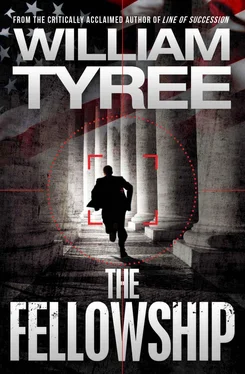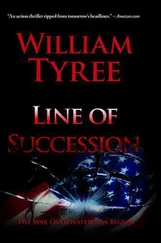William Tyree - The Fellowship
Здесь есть возможность читать онлайн «William Tyree - The Fellowship» весь текст электронной книги совершенно бесплатно (целиком полную версию без сокращений). В некоторых случаях можно слушать аудио, скачать через торрент в формате fb2 и присутствует краткое содержание. Год выпуска: 2013, Издательство: Massive, Жанр: Триллер, на английском языке. Описание произведения, (предисловие) а так же отзывы посетителей доступны на портале библиотеки ЛибКат.
- Название:The Fellowship
- Автор:
- Издательство:Massive
- Жанр:
- Год:2013
- ISBN:нет данных
- Рейтинг книги:5 / 5. Голосов: 1
-
Избранное:Добавить в избранное
- Отзывы:
-
Ваша оценка:
- 100
- 1
- 2
- 3
- 4
- 5
The Fellowship: краткое содержание, описание и аннотация
Предлагаем к чтению аннотацию, описание, краткое содержание или предисловие (зависит от того, что написал сам автор книги «The Fellowship»). Если вы не нашли необходимую информацию о книге — напишите в комментариях, мы постараемся отыскать её.
The Fellowship — читать онлайн бесплатно полную книгу (весь текст) целиком
Ниже представлен текст книги, разбитый по страницам. Система сохранения места последней прочитанной страницы, позволяет с удобством читать онлайн бесплатно книгу «The Fellowship», без необходимости каждый раз заново искать на чём Вы остановились. Поставьте закладку, и сможете в любой момент перейти на страницу, на которой закончили чтение.
Интервал:
Закладка:
BMW Factory
Munich
Wolf stepped off the bus in front of the BMW factory. He heard a distant droning and peered skyward, scanning the skies for aircraft. Although Cologne had so far gotten the worst of the British air raids, Munich had not been entirely spared. It too had suffered a raid in September. The city’s first taste of British bombardment had been relatively mild, but Wolf figured that sooner or later, the BMW factory — which had shifted most of its production toward aircraft engines and military motorcycles — would be on the Allied hit list.
“It’s just the machines,” a gravelly voice said.
Wolf turned. The voice belonged to a man in a brown jumpsuit with a circular BMW logo patch on the front. His hair was gray and wild atop his head, like a fox that had rubbed itself in the dirt.
“That sound,” the man clarified. “It’s not the RAF. It’s just the machines inside the factory.”
“You work here?”
“Yes. I have papers if you need to see them.”
“Relax,” Wolf said. He pointed at the insignia on the lapels of his black SS uniform. “I’m not Gestapo. I’m looking for a man named Leo Kruger.”
“East wing, third floor. Kruger works on pistons.”
Wolf tipped his hat and went on his way, striding through the front doors without pausing at reception. Although not yet an officer, nobody seemed to question the legitimacy of a black SS uniform. Besides, he did not want his visit documented. This was personal business.
He walked past rows of identically dressed workers assembling propellers. Each worker had a nameplate, a number and various tools and parts before him. The workers were, without exception, gray or silver-haired.
Wolf broke out into a sweat as he took the stairs to the third floor and surveyed another hundred or so workers. He easily spotted the supervisor, who was, judging by the amount of fat around his midsection, enjoying extra food rations.
“I’m looking for Kruger,” Wolf whispered. The supervisor walked into the middle of the floor and plucked Kruger out of one of the rows of workers.
The former priest wore a greasy blue shirt and a black wool cap. Eyes cast downward, back bent. Sleeves were rolled up, revealing forearms streaked with scar tissue.
When Kruger had spoken of his employment at BMW, Wolf had imagined that the great Jesuit teacher was some sort of supervisor, perhaps leading a team of researchers. He imagined Kruger smartly dressed, drawing up development plans on a drafting board. Although the priest had said nothing to lead him to this conclusion, Wolf felt somehow beguiled by the man standing before him now.
The two exchanged perfunctory greetings. Virtually every single worker on the floor was watching them.
“Is there somewhere we can talk privately?”
Kruger leaned close, speaking into Wolf’s ear. “Sebastian,” he said, “you’ve managed to build something for yourself. You can’t afford to be seen with someone like me.”
“Nonsense,” Wolf insisted. “I need to talk to you. Is there somewhere we can go?”
Kruger motioned to the wider room. “Obviously not.”
“Then meet me after work. Please.”
Kruger hesitated, feeling the eyes of his fellow workers on him. “Where?”
“Haufbrauhaus,” Wolf whispered. It was one of the oldest and most popular beer halls in Munich. Although there was far less drunkenness on display in recent years, it was still lively.
“No. Too public.”
“Then the Ratskellar ,” Wolf suggested, referring to the basement restaurant beneath the medieval town hall building with the famous Glockenspiel clock tower. It was cavernous, a bit darker than the other beer halls, and certainly less popular.
Kruger stepped back and spat on the cement floor. “Five thirty,” he said. “Be punctual.”
Marienplatz
Munich
At 5 pm, Wolf set out for the Ratskellar, leaving his arm sling behind for the first time since leaving the hospital in Paris. The shoulder still throbbed, but he thought it wise to toughen himself up before reporting for duty again. Nagel had questioned his suitability for service repeatedly during training, mocking his dream of a life in academia. By his third week at Wewelsburg Castle, Wolf decided that he would never again reveal any weakness, no matter how difficult those shortcomings were to mask. From then on, he resolved to live the motto that was inscribed on his dagger: Be more than you seem.
He walked through his old neighborhood, noting with regret how quickly the architectural perfection of Marienplatz was being changed by the war. The facade of a bank had been reduced to brick during the September air raids. In response, two anti-aircraft batteries had been erected on opposite sides of the square. Several Hitler Youth patrols roamed the streets. The patrol leaders were younger and more aggressive than ever before. As dusk fell, a pack of boys went door to door, ordering shopkeepers to turn off their lights so as to deprive Allied planes of ground targets.
On another corner, a pair of boys harassed a young woman for being too thin. Slim women were not good for childbearing, one of them told her. She should fatten up and find a husband.
“And how is she supposed to do that?” Wolf shouted as he came up behind the youth patrol. The boys stood at attention at the sight of Wolf’s uniform. “All the able-bodied men are at war, and the government is rationing food. What is she to do? Boil wallpaper and marry one of you?”
The girl — she could not have been more than 17 — flashed Wolf a grateful smile as she slipped away from the stunned youth brigade. He stood unmoving for a time, surprised at how his presence seemed to freeze the boys where they stood while the crowds in Marienplatz moved around them. There were six of them. He guessed they were 12 or 13 years old, although they seemed jaded beyond their years. He had heard that some of the youth brigades had been taken on field trips into Poland, where they practiced giving orders to political prisoners living in the ghettos. Show no pity, they were told. He was quite certain this bunch would have no trouble with that.
He dismissed them. They dispersed like a pack of puppies, moving to the other side of the square, where they would no doubt refocus their harassment on someone else. Wolf sighed in relief. If one of the little punks had so much as gripped his left shoulder, he would have been driven to his knees.
The Glockenspiel clock tower on the town hall was covered with a draping red swastika banner. Wolf walked under it, through the main archway and into the interior courtyard. He descended two sets of stairs and stood just above one of several Ratskellar dining rooms. As he had hoped, it was not busy. A few tables occupied by old men.
A maitre d’ in a smart suit approached. “Table for one?”
Wolf straightened his posture, working through the pain as he brought his shoulders into alignment. “I’m meeting someone. Take me somewhere private.”
He was led through the first room, into a smaller secondary dining room, where there were fewer lights. Wolf sat at a corner table with his back to the wall. He pulled out a silver cigarette case and opened it, revealing several dozen food stamps. He presented them to a waiter and ordered two beers.
He didn’t have to wait long. Leo Kruger arrived at the precise moment that the drinks were delivered to the table. Kruger sat down uneasily. The sullied blue shirt and dirty face told Wolf that he hadn’t had time to stop home from work yet.
“Father Kruger,” Wolf said. He gestured toward the second beer. “Please.”
Kruger sat, but did not touch the mug. “Perhaps I wasn’t clear at dinner,” Kruger said. “I am no longer a priest.”
Читать дальшеИнтервал:
Закладка:
Похожие книги на «The Fellowship»
Представляем Вашему вниманию похожие книги на «The Fellowship» списком для выбора. Мы отобрали схожую по названию и смыслу литературу в надежде предоставить читателям больше вариантов отыскать новые, интересные, ещё непрочитанные произведения.
Обсуждение, отзывы о книге «The Fellowship» и просто собственные мнения читателей. Оставьте ваши комментарии, напишите, что Вы думаете о произведении, его смысле или главных героях. Укажите что конкретно понравилось, а что нет, и почему Вы так считаете.











